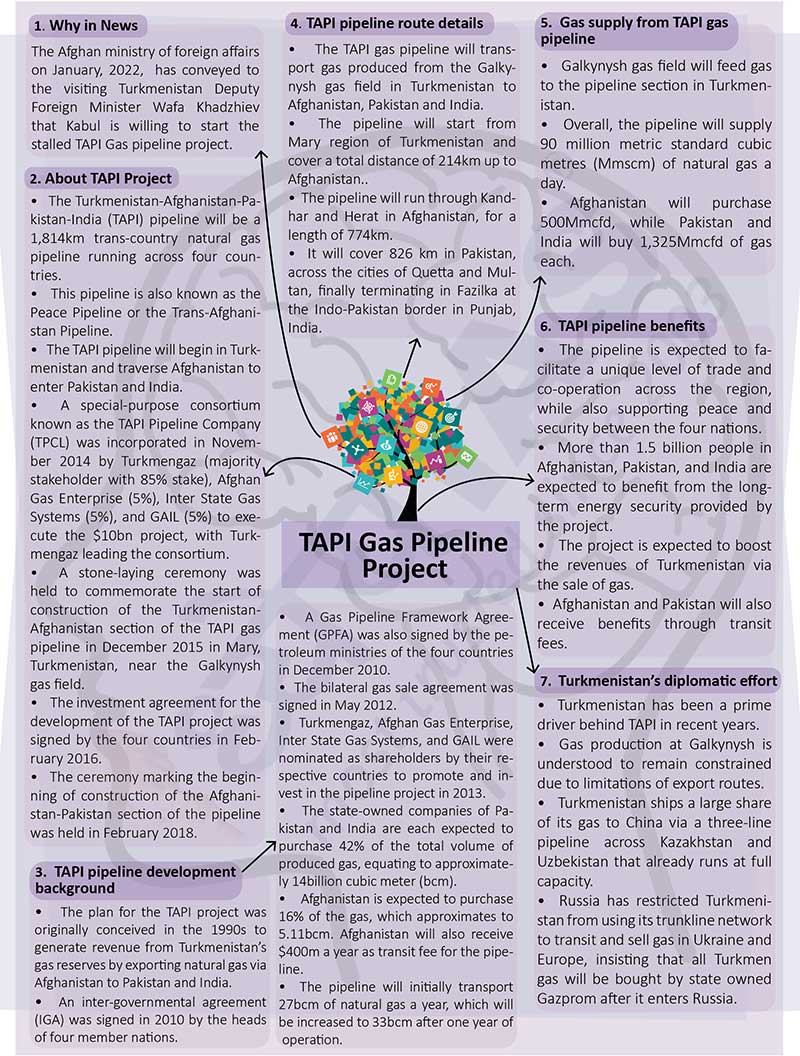Brain-booster /
22 Feb 2022
Brain Booster for UPSC & State PCS Examination (Topic: TAPI Gas Pipeline Project)

Why in News?
- The Afghan ministry of foreign affairs on January, 2022, has conveyed to
the visiting Turkmenistan Deputy Foreign Minister Wafa Khadzhiev that Kabul
is willing to start the stalled TAPI Gas pipeline project.
About TAPI Project
- The Turkmenistan-Afghanistan-Pakistan- India (TAPI) pipeline will be a
1,814km trans-country natural gas pipeline running across four countries.
- This pipeline is also known as the Peace Pipeline or the
Trans-Afghanistan Pipeline.
- The TAPI pipeline will begin in Turkmenistan and traverse Afghanistan to
enter Pakistan and India.
- A special-purpose consortium known as the TAPI Pipeline Company (TPCL)
was incorporated in November 2014 by Turkmengaz (majority stakeholder with
85% stake), Afghan Gas Enterprise (5%), Inter State Gas Systems (5%), and
GAIL (5%) to execute the $10bn project, with Turkmengaz leading the
consortium.
- A stone-laying ceremony was held to commemorate the start of
construction of the Turkmenistan- Afghanistan section of the TAPI gas
pipeline in December 2015 in Mary, Turkmenistan, near the Galkynysh gas
field.
- The investment agreement for the development of the TAPI project was
signed by the four countries in February 2016.
- The ceremony marking the beginning of construction of the Afghanistan-
Pakistan section of the pipeline was held in February 2018.
TAPI pipeline development background
- The plan for the TAPI project was originally conceived in the 1990s to
generate revenue from Turkmenistan’s gas reserves by exporting natural gas
via Afghanistan to Pakistan and India.
- An inter-governmental agreement (IGA) was signed in 2010 by the heads of
four member nations.
- A Gas Pipeline Framework Agreement (GPFA) was also signed by the
petroleum ministries of the four countries in December 2010.
- The bilateral gas sale agreement was signed in May 2012.
- Turkmengaz, Afghan Gas Enterprise, Inter State Gas Systems, and GAIL
were nominated as shareholders by their respective countries to promote and
invest in the pipeline project in 2013.
- The state-owned companies of Pakistan and India are each expected to
purchase 42% of the total volume of produced gas, equating to approximately
14billion cubic meter (bcm).
- Afghanistan is expected to purchase 16% of the gas, which approximates
to 5.11bcm. Afghanistan will also receive $400m a year as transit fee for
the pipeline.
- The pipeline will initially transport 27bcm of natural gas a year, which
will be increased to 33bcm after one year of operation.
TAPI pipeline route details
- The TAPI gas pipeline will transport gas produced from the Galkynysh gas
field in Turkmenistan to Afghanistan, Pakistan and India.
- The pipeline will start from Mary region of Turkmenistan and cover a
total distance of 214km up to Afghanistan..
- The pipeline will run through Kandhar and Herat in Afghanistan, for a
length of 774km.
- It will cover 826 km in Pakistan, across the cities of Quetta and Multan,
finally terminating in Fazilka at the Indo-Pakistan border in Punjab, India.
Gas supply from TAPI gas pipeline
- Galkynysh gas field will feed gas to the pipeline section in
Turkmenistan.
- Overall, the pipeline will supply 90 million metric standard cubic
metres (Mmscm) of natural gas a day.
- Afghanistan will purchase 500Mmcfd, while Pakistan and India will buy
1,325Mmcfd of gas each.
TAPI pipeline benefits
- The pipeline is expected to facilitate a unique level of trade and
co-operation across the region, while also supporting peace and security
between the four nations.
- More than 1.5 billion people in Afghanistan, Pakistan, and India are
expected to benefit from the longterm energy security provided by the
project.
- The project is expected to boost the revenues of Turkmenistan via the
sale of gas.
- Afghanistan and Pakistan will also receive benefits through transit
fees.
Turkmenistan’s diplomatic effort
- Turkmenistan has been a prime driver behind TAPI in recent years.
- Gas production at Galkynysh is understood to remain constrained due to
limitations of export routes.
- Turkmenistan ships a large share of its gas to China via a three-line
pipeline across Kazakhstan and Uzbekistan that already runs at full
capacity.
- Russia has restricted Turkmenistan from using its trunkline network to
transit and sell gas in Ukraine and Europe, insisting that all Turkmen gas
will be bought by state owned Gazprom after it enters Russia.







